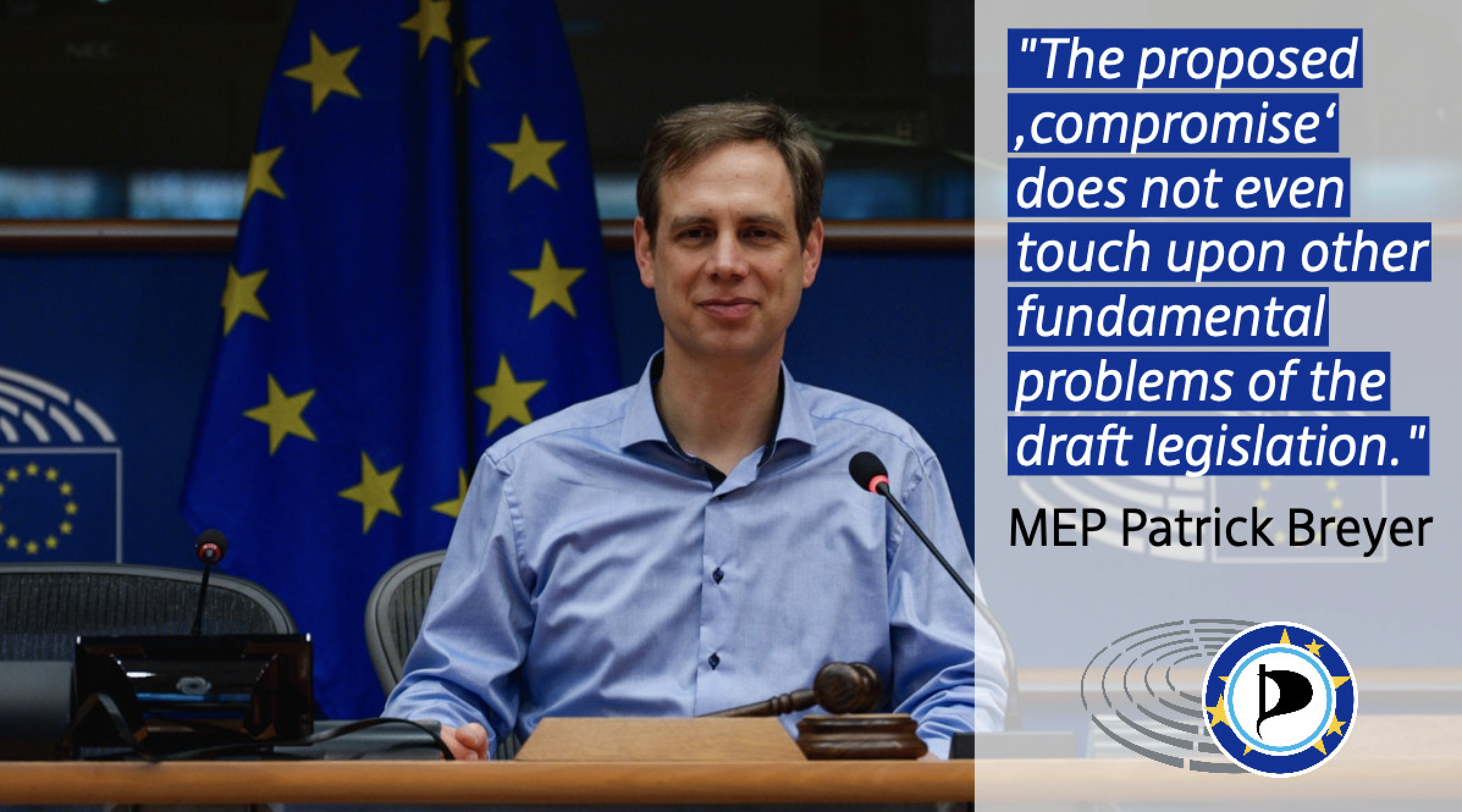Terrorists will have no problem writing their own encryption program, and more ordinary citizens will install malicious apps from unofficial app stores.
And everyone else will have their shit dumped out in the open when ai starts breaking through all the back doors and manipulating officials into clearing them
You’ll never decode me and my brother’s Pig Latin
Wait for the LLM’s based on pig Latin
GPT4 can already infer and translate pig latin
No need for a pig latin specific LLM
Writing your own is hard. They won’t have a problem illegally using Signal
e2e is pretty simple. I agree with your second sentence, though.
Writing ur own is not hard i did it at 16 without chatgpt its piss easy.
I’ve done it at 15, now I’m 16 ;)
Gotta one up me u little shit.
Nar thats cool keep the passion make cool shit name ur variables sensibly try avoid cpp at all costs.
Ah… terrorist, the magic word. That’s why you can’t have a SIM card which is not tied to your ID or passport in EU since 2015. Terrorists actions allowing an state entity throwing 4000t of explosive on civils in a weekend… yep yep…
more seriously (though I wasn’t totally kidding), your non-tech relatives and friends are all on whatsapp/insta/messenger, good luck to move them.
I have helped a little with some ongoing research on the subject of client-side-scanning in a European research center. Only some low level stuff, but I possess a solid background in IT security and I can explain a little what the proposition made to the EU is. I am by no means condemning what is proposed here.I myself based on what experts have explained am against the whole idea because of the slippery slope it creates for authoritarian government and how easily it can be abused.
The idea is to use perceptual hashing to create a local or remote database of known abuse material (Basically creating an approximation of already known CP content and hashing it) and then comparing all images accessible to the messaging app against this database by using the same perceptual hashing process on them.
It’s called Client-Side-Scanning because of the fact that it’s simply circumventing the encryption process. Circumvention in this case means that the process happens outside of the communication protocol, either before or after the images, media, etc, are sent. It does not matter that you use end-to-end encryption if the scanning is happening on you data at rest on your device and not in transit. In this sense it wouldn’t directly have an adverse effect on end-to-end encryption.
Some of the most obvious issues with this idea, outside of the blatant privacy violation are:
- Performance: how big is the database going to get? Do we ever stop including stuff?
- Ethical: Who is responsible for including hashes in the database? Once a hash is in there it’s probably impossible to tell what it represent, this can obviously be abused by unscrupulous governments.
- Personal: There is heavy social stigma associated with CP and child abuse. Because of how they work, perceptual hashes are going to create false positives. How are these false positives going to be addressed by the authorities? Because when the police come knocking on your door looking for CP, your neighbors might not care or understand that it was a false positive.
- False positives: the false positive rate for single hashes is going to stay roughly the same but the bigger the database gets the more false positive there is going to be. This will quickly lead to problems managing false positive.
- Authorities: Local Authorities are generally stretcht thin and have limited resources. Who is going to deal with the influx of reports coming from this system?
This is a really nice summary of the practical issues surrounding this.
There is one more that I would like to call out: how does this client scanning code end up running in your phone? i.e. who pushes it there and keeps it up to date (and by consequence the database).
I can think of a few options:
- The messaging app owner includes this as part of their code, and for every msg/image/etc checks before send (/receive?)
- The phone OS vendor puts it there, bakes it as part of the image store/retrieval API - in a sense it works more on your gallery than your messaging app
- The phone vendor puts it there, just like they already do for their branded apps.
- Your mobile operator puts it there, just like they already do for their stuff
Each of these has its own problems/challenges. How to compel them to insert this (ahem “backdoor”), and the different risks with each of them.
Another problem: legislation like this cements the status quo. It’s easy enough for large incumbents to add features like this, but to a handful of programmers trying to launch an app from their garage, this adds another hurdle into the process. Remember: Signal and Telegram are only about a decade old, we’ve seen new (and better) apps launch recently. Is that going to stop?
It’s easy to say “this is just a simple hash lookup, it’s not that big a deal!”, but (1) it opens the door to client-side requirements in legislation, it’s unlikely to stop here, (2) if other countries follow suit, devs will need to implement a bunch of geo-dependant (?) lookups, and (3) someone is going to have to monitor compliance, and make sure images are actually being verified–which also opens small companies up to difficult legal actions. How do you prove your client is complying? How can you monitor to make sure it’s working without violating user privacy?
Also: doesn’t this close the door on open software? How can you allow users to install open source message apps, or (if the lookup is OS-level) Linux or a free version of Android that they’re able to build themselves? If they can, what’s to stop pedophiles from just doing that–and disabling the checks?
If you don’t ban user-modifiable software on phones, you’ve just added an extra hurdle for creeps: they just need to install a new version. If you do, you’ve handed total control of phones to corporations, and especially big established corporations.
I get the concept but this doesnt realy offer any advantages over just not encrypting anything at all. The database being checked againts can still just include a hash of somethibg the governemnt doesnt like and boom u have a complete tool for absolute cencoring of everything.
In this sense it wouldn’t directly have an adverse effect on end-to-end encryption.
imo E2EE includes the environment in its scope as a complete product, and I don’t see how this can be executed without weakening the environment’s security.
I’m deeply against this ridiculous proposal.
But scanning of messages already happens, tbf, for spell checking, emoji replacement, links to known infectious sites.
Photo copiers do client side scanning to prevent copying of money.
There are precedents.
I hate this proposal. But let’s be straight about the facts: The phone has full access to everything you send and receive already. This isn’t the same as having an encryption back door.
There are precedents, but we can forego these if we want. I don’t have to use Google’s keyboard. I can even degoogle my phone with Graphene OS. Some black boxes remain of course but they are small and relatively secure. Meanwhile a client-side scanner is adding an unavoidable increase to the attack surface. That’s a weakened security environment. And not just for your cat videos, but for journalists and others dealing with sensitive materials.
I can’t wait to see how many horrible implementations devs come up with because this feature provides no value for their employers.
Thanks for the explanation. Do you know how they’re planning to implement this client side scanning? Take an iPhone for example— where Apple has already ditched their plans to do the same device-wide. Is it planned for WhatsApp, Signal etc. to be updated to force perpetual scanning of the iPhone’s photo album? Because that can be turned off quite easily at the OS level.
The only way I could see them doing it is by scanning any image that is selectively chosen to be sent before the actual message itself is sent—i.e. after it’s selected but before the send button is pressed. Otherwise it’s breaking the E2E encryption.
Is that the plan?
Client-Side-Scanning is going to be implemented by the messaging app vendor. This means that it’s limited by OS or Browser sandboxing . Therefore it’s definitely limited to what the messaging app has access to. However, I’m not sure what the actual scope would be, meaning if all accessible images are going to be scanned or only the one being transmitted to someone.
What stops you from using a free software client that verifiably doesn’t do so? The mainstream messengers were not safe already anyway.
Hehe, this reminds me this: https://www.nytimes.com/2022/08/21/technology/google-surveillance-toddler-photo.html
False positive… but the damage is done, and I don’t know if google finally stopped to accuse him, police already freed him as it was a medical photo.
People in Reddit and sometimes here always praise the EU as some bastion of privacy, and I always got downvoted when I said that this isn’t always true. And now here we are. I hope people don’t forget this after a month, like they always do.
They will, and you’re screaming into the wind sadly.
What you can do is never forget and base your voting decisions to include this as a priority going forward. Endorse and support companies that protect privacy.
It’s a long uphill battle and every little thing can help no matter how small.
Maybe say this after this passes.
That’s the attitude I was talking about 😄
Yeah, no. What’s likely to happen is that you will remember this, completely miss the memo that the law didn’t pass and then go on spreading misinformation about the EU.
What is wrong with the eu? Why do they need to always ban end to end encryption?
Lobbyists.
Lobbiests are probably the one reason they haven’t passed such anti-privacy laws, actually.
There’s lobbying on both sides
As I remember at the moment partly Von Der Leyen, the current Commission president. She is a German Christian democrat and apparently bit with capital C. Meaning she has bit of a moral panic streak on her of the “won’t you think of the children” variety. As I understand this current proposal is very much driven by her.
However her driving it doesn’t mean it sail through to pass as legislation. Some whole memberstate governments are against the encryption busting idea.
And the fact that Ylva Johansson, being technologically illiterate as well as a close bed buddy with companies in the surveillance industry that stand to earn a crap load of money doesn’t help…
Von Der Leyen is a swinger clubber
I’m sure they will tell you it’s weighing the security (against terrorists, criminals, etc) of the many against the security (from seeing dick pics or messaging a mistress) of the few.
The thing that always kills me about that phrase is “the needs of the many” are “the needs of the few,” because “the many” is just a gaggle of “fews.”
5 eyes. Politicians are puppets.
Wait, you have a choice to vote for either puppet 1, puppet 2, or puppet 3. Your choice matters! … as long as the politicians podiums are provided by the rich we don’t have a real say.
So for, here is what I can tell from specific countries:
On board with privacy destroying law:
Spain, Hungary, Cyprus
Mostly on board: (support on device scanning but not weakening E2EE)
Ireland, Denmark
Against:
Finland, Germany
Feel free to update this if you know more.
Source: https://www.wired.com/story/europe-break-encryption-leaked-document-csa-law/
IIRC Netherlands change something in their laws that makes it impossible for them to support any proposals that go against end-to-end encryption technologies.
Very interesting. How likely is it to be approved though, given the opposition? Alao, what about the rest of the EU countries?
It will at minimum be a fight. It won’t just sail through. Also whole governments being against means one of them might challenge the law in to European Court of Justice. Since as nation-states also often have, EU itself has charter of rights part in the fundamental EU treaties. It also has normal limit and share of powers. EU Council and Parliament aren’t all powerfull. ECJ can rule a directive or regulation to be against the core treaties like Charter of Fundamental Rights of the European Union.
Said charter does include in it right to privacy (which explicitly mentions right to privacy in ones communications) and protection of personal data. Obviously none of these are absolute, but it means such wide tampering as making encryption illegal might very well be deemed to wide a breach of right to private communications.
Oh and those who might worry they wouldn’t dare at ECJ… ECJ has twice struck down the data protection agreement negotiated by EU with USA over “USA privacy laws are simply incompatible, no good enough assurances can be given by USA as long as USA has as powerful spying power laws as it has”. Each time against great consternation and frankly humiliating black eye to the Commission at the time.
ECJ doesn’t mess around and doesn’t really care their ruling being mighty politically inconvenient and/or expensive to EU or it’s memberstates. They are also known for their stance that privacy is a corner stone civil right (as stated in the charter and human rights conventions also, their legal basis) and take it very seriously as key part of democracy and protection of democracy. Without free and private communications and expression there can be no free political discussion, without free political discussion there can be no democracy.
And the EU is wondering why they’re having an image problem
Let’s wait after Polish and German elections. People are fed up with this.
Making it illegal only hampers those that follow the law.
Criminals, by definition, already don’t follow the law.
Exactly. When privacy is criminal, only criminals will have privacy.
Thing is, there are a load of people who don’t have the know how, time and/or care to use an alternative. That goes for scum bags sharing child porn, terrorists teaching how to make an easy pipe bomb, journalists reporting on local corruption, people sending flirty sexts to their spouses, activists trying to get a movement going, anti-vax groups, people trying to source dubiously legal and/or ethical drugs/medicines… and so on.
Banning it in mainstream apps and legal stores makes it harder - and harder to know if you can trust an app (is this niche one I found through pirates-r-us forum really trustworthy) - and easier to spot and target those who use illegal/minority options.
So I think you would catch and block a load of CSAM, even though obviously not all.
While this would be terrible if it passes, a part of me hopes a silver lining would be a massive surge in open source development focusing on privacy respecting software that does not follow or enable this disgusting behavior by the eu
Software which may be made illegal.
How would such a ban ever be enforceable?
If you are using Windows or mac, they will be first in line to implement “protection” against “insecure software” :)
Or Android with Google Play. It already does this BS, even if you disable scanning.
Lineage/Graphene/DivestOS here I come.
Yesterday Google play kindly un-installed KDE connect for my “security” as it is a “dangerous app”
I promptly re-installed from f-Droid.

But all the Google defenders will say “it was for our own good” or the app dev did something that looked suspicious. 🤦♂️
And since I didn’t want to root my old phone, I just disabled all of the Google services via adb.
But, but, now your phone could be hacked!! 🤣
(yes, sarcasm, lol)
The Google bootlickers tell me my phone is at risk since it’s rooted. As if every single Linux, Unix, and Windows box doesn’t have root access for specific users. And Windows is so flawed they require a privilege escalation to perform fairly innocuous functions.
When I said privacy respecting software, I definitely did not mean windows or Mac lol. Open source is the only way to actually know something respects your privacy, so both those pieces of software are inherently not that. Linux for life!
That’s like already the thing, if I modify my little “secure encrypted sharing protocol” windows will flag it as a virus if I send it (the software) to someone … Then after some time it’s ok. Guess it’s about those antivirus heuristics, but it’s not like it’s not putting a big stick in my bicycle wheel.
Ostensibly via TCPA.
Fuck thats terifying.
It wouldn’t be, on Linux at least
Unless TCPA is implemented by manufacturers.
Gamers are here and coming in mass and don’t care about FOSS or security, so I won’t hold my breath.
How are many other similar bans enforceable? Like CSM itself. With a lot of difficulties.
This is almost definitely not going through the ECJ. If they pass this directive I’m gonna take my chances.
Thanks to the Matrix protocol there is no chance of getting rid of E2EE communication anyway. There is no feasible way to stop decentralized communication like that, no without killing the internet.
Also I would add, not like this is unanimously supported in EU among memberstates. So this isn’t a done deal, this is a legislative proposal. Ofcourse everyone should activate and campaign on this, but its not like this is “Privacy activists vs all of EU and all the member state governments” situation. Some official government positions on this one are “this should not pass like it is, breaking the encryption is bad idea”.
Wouldn’t be first time EU commission proposal falls. Plus as you said ECJ would most likely rule it as being against the Charter of Rights of European Union as too wide breach of right to privacy.
What fucking fascists.
Is it related to the topic, or just saying it? 😂
Fascism, authoritarianism, totalitarian dystopian thinking, it’s all the same to me when it comes to the State overstepping and blatantly looking to pass laws that remove the right to privacy and autonomy from citizens. I’m no leftist ideologue, I skew libertarian right (although I couldn’t describe all the nuance of my views within the context of a simple label), but if there’s one thing we have in common, it’s our hatred of government overreach and corporate control of the masses.
Fuck authoritarianism. Fuck collectivist bullshit. Never stand for the trampling of your rights.
Just imagine the headline we’d see in the west if this was happening in China.
deleted by creator
@lud @makeasnek With more government controls and intervention, its possible. I learned how to use PGP pretty efficiently but there is absolutely no one in my daily life that also uses it.
Manual encryption with personal keys may become the norm if less and less services are able to use it.
If apps would turn off e2e encryption, how would it be? Would it affect bordering regions? Users of VPNs inside EU?
My country proposed a ban on VPN software (targeting appstores providibg them), it can also target messengers. If I get a EU version of this app, or if I use a european VPN to connect via it, would I be less safe sending political memes?
I wonder if projects like Signal could make a community run and certified hash database that could be included in Signal et al without threat of governments and self-interested actors putting malicious entries in. It definitely doesn’t solve every problem with the client side scanning, but it does solve some.
But… an open, verifiable database of CSAM hashes has its own serious problems :-S Maybe an open, audited AI tool that in turn makes the database? Perhaps there’s some clever trick to make it verifiable that all the hashes are for CSAM without requiring extra people to audit the CSAM itself.
You’re unfortunately also handing people distributing csam a way to verify whether their content would be detected by checking it against the database
Yes, though doesn’t client side scanning do that anyway? Or must the client side scan be completely secret and also only communicate to law enforcement/whatever secretly?
@makeasnek
Imagine a data leak in such a situation.




















